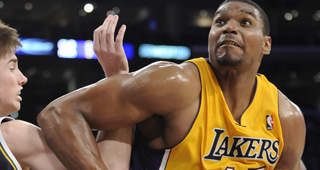“You can’t teach that type of size. Look how big [Andrew Bynum] is. He’s monstrous.” -- Sean Elliott
Before Andrew Bynum’s dominant performance against the San Antonio Spurs on Wednesday night, only four Los Angeles Lakers had ever had 30 rebounds in one game: George Mikan, Elgin Baylor, Wilt Chamberlain and Kareem Abdul-Jabbar. That’s the type of company he is capable of keeping.
Bynum has drawn more headlines for his often immature behavior this season, but the real story is his production on the court. He’s averaging 18.4 points, 12.2 rebounds and 2.0 blocks on 56.4% shooting; his PER (23.0) is at an all-time high. It’s time the Lakers became his team, and the more Kobe Bryant resists, the uglier the situation is going to become.
Bynum is 7’0, 285. He has a 7’6 wingspan, big and soft hands, excellent footwork in the low block as well as a free throw shooting percentage of 68%. Individual defense is ultimately about being bigger, faster and longer than your opponent; there isn’t a player in the NBA who is bigger, faster and longer than Bynum.
It’s no real surprise he’s been passive-aggressively rebelling by jacking up three pointers and ignoring the coaching staff. As a big man, there’s nothing more frustrating than working to establish position in the low block and then watching your guards jack up shot after shot after shot. This season, Kobe is averaging 23 shots and shooting 43% from the floor; Bynum is at 12 while shooting 56%.
That’s practically basketball malpractice. It would be as if, during last season’s playoffs, the Mavericks decided to ignore Dirk Nowitzki (52%) and run their entire offense around Jason Terry (45%) instead. There’s no defense for a seven-footer who can create his own shot, which is why NBA championships have been decided in the paint ever since Michael Jordan’s retirement.
What made Jordan such a transcendent player was his ability to turn basketball’s usual height dynamic on its head. Jordan had a career shooting percentage of 49.7%; he had a big man’s shooting efficiency while still playing from the perimeter. In contrast, Kobe’s career shooting percentage is only 45.3% and his best days are long behind him. There’s no shame in not matching Jordan’s accomplishments, but Kobe’s doomed attempts to do so are now a net detriment to the Lakers.
In their last three games without Kobe on the floor, Los Angeles has shot 48.5% from the floor. On the season, they are shooting 45.7%. It’s inexcusable for a team’s offense to improve when a player with Kobe’s impeccable basketball IQ isn’t playing, but that’s what happens when you lose a player who takes a huge percentage of your shots inefficiently.
With Kobe out, the ball has moved far more crisply, while the Lakers have made a more concerted effort to feed Bynum the ball. Big men, as Shaq once famously declared, are more in tune with every aspect of the game when they are getting the ball, and Bynum has responded to the offensive freedom by increasing his effort on the boards.
Last season, the Mavericks won a championship with a two-headed interior tandem of an elite offensive 7’0 (Dirk) and an elite defensive 7’0 (Tyson Chandler). Bynum can be an elite 7’0 at both ends of the floor.
There’s no rarer or more important type of player in basketball. Since Jordan’s retirement, there have only been three: Shaq, Tim Duncan and Kevin Garnett. In an NBA increasingly devoid of great big men, Bynum can single-handedly change the balance of power.
Dwight Howard has been the biggest prize on the NBA trade market since the end of the lockout; the Lakers no longer need him. While Bynum’s injury history is always a concern, if healthy, he’s much more gifted offensively than Howard, who lacks the finesse or the skill level to become a primary offensive option on a title team. In any NBA trade value chart, the only player that should rank higher than Bynum is LeBron James.
At only 25-years-old, his time is now. His mere presence alters team’s rotations: the Oklahoma City Thunder are most dangerous when they can play Kevin Durant at power forward and Serge Ibaka at center, but they’ll need to keep Kendrick Perkins on the floor to match up with Bynum. The San Antonio Spurs have been far superior to the Lakers all season long, but they’re going to have to cross their fingers to avoid Bynum on their side of the playoff bracket.
Bynum is capable of winning an MVP award, but not when someone else on his team is taking twice as many shots. And until Kobe cedes control of the team, Los Angeles will not win another championship.



